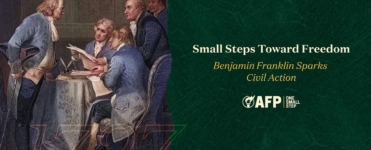
Federal agencies are on notice: The Supreme Court may soon reel in bureaucratic overreach
The end of the Chevron doctrine could be the end of unaccountable bureaucrats making up the rules as they go
What is the Chevron doctrine? And why am I talking about it in a civil liberties newsletter? Well, let me tell you a story. It starts with a fisherman. Call me Ishmael.
Oops, that’s the start of Herman Melville’s novel Moby-Dick. But you could say that Chevron has long been the white whale for many constitutional lawyers.
Which makes recent news all the more exciting: An upcoming case in front of the Supreme Court could overturn Chevron and have a monumental impact on protecting your freedom from an unaccountable administrative state.
This is simply great news. The Supremes may be ready to really take on the administrative state, and with a case that makes very clear the degree to which bureaucrats are grabbing powers Congress never gave them. https://t.co/O2Fs1Y3XIm via @WSJ
— Kimberley Strassel (@KimStrassel) May 2, 2023
The 1970s origins of today’s case
But I’m getting ahead of myself. Let me back up and start at the beginning, which is in 1976, when ABBA was at the top of the charts and, more relevantly here, the Magnuson-Stevens Act passed.
The MSA grants the National Marine Fisheries Service the power to require domestic vessels in federal waters to carry federal monitors to ensure those vessels are following regulations. It’s like being required to have a state trooper in the passenger seat to be sure you don’t speed.
However, the MSA doesn’t say who pays for these federal monitors, except in very specific situations. Congress’ default assumption, in other words, was that the government would pay for its own monitoring. But when the NMFS (a federal agency within the U.S. Department of Commerce’s National Oceanic and Atmospheric Administration) ran out of money, it interpreted the MSA to mean it also had the power to force certain fishermen to pay the salaries of the contracted third-party monitors that the government was requiring them to carry.
The fishermen are fighting an unlawful scheme that would force them to fork over up to 20% of their revenue ($710+/day!) to pay for monitors to ride their boats and watch them fish. Imagine having to let a gov’t-approved inspector watch you work, and paying their salary, too!
— Ryan Mulvey (@RPMulvey) November 10, 2022
Although the fishermen’s pay is dependent on catch, the monitor gets paid no matter what.
Fishermen fight back
You can imagine how fishermen felt about this. So a group of small, multi-generational family-owned New Jersey businesses sued. Their case is known as Loper Bright Enterprises v. Raimondo and they’re represented by my colleagues at Cause of Action Institute, an organization, like Americans for Prosperity, in the Stand Together community.
The fishermen accept that the MSA authorizes the NMFS to require federal monitors but argue that the unelected NMFS can’t make the arbitrary decision to put the onus to pay on the fishermen.
At first glance, this lawsuit could easily be mistaken for a simple dispute about payment. But at its heart, it’s a fight over federal regulatory overreach that affects all of us. These fishermen are pushing back against the idea that the federal government can make demands of the American people without obtaining approval from Congress.
Hear from the NJ fishermen why they’re fighting back
Last week, the Supreme Court granted certiorari in (a.k.a agreed to hear) Loper Bright Enterprises. And the fishermen’s case gives the Court an opportunity to review and overrule a precedent set in a 1984 Supreme Court Case, Chevron U.S.A., Inc. v. Natural Resources Defense Council, Inc.
Chevron v. NRDC established the Chevron doctrine, which calls on courts to defer to federal agencies’ interpretation of the very federal laws that they enforce. This means courts are trusting the agencies to interpret the laws that authorize them to act. Unsurprisingly, agencies have every reason to interpret those laws broadly to expand their own power. And when courts defer to the agencies, they put the thumb on the scale for government against its citizens.
As my colleague and super-lawyer Ryan Mulvey said,
“The Supreme Court has an opportunity to correct one of the most consequential judicial errors in a generation. Chevron deference has proven corrosive to the American system of checks and balances and directly contributed to an unaccountable executive branch, overbearing bureaucracy, and runaway regulation.”
Check out COA’s press release on the news!
Civil liberties connection
But how are the administrative state and civil liberties connected? This is, after all, a civil liberties newsletter.
This case is ultimately about the constitutional separation of powers, which was the first way that the founding fathers thought we could protect civil liberties. In fact, James Madison first argued the First Amendment was unnecessary because the Constitution’s structural guarantees — separation of powers and federalism — would ensure the branches and levels of government checked each other and therefore prevented one branch from obtaining too much power.
Then came the rise of the administrative state, the alphabet soup of federal agencies made up of unelected bureaucrats empowered by decisions like Chevron to impose on Americans regulations the lawmaking body under our Constitution — Congress — never considered.
I often talk about administrative bloat on campuses, but administrative bloat is real in government across the board. On campus or in Washington, D.C., an unaccountable administrative state that can make up the rules as it goes is a threat to civil liberties.
We’ve seen that threat manifest repeatedly against First Amendment rights:
- The U.S. Department of Homeland Security announced a Disinformation Governance Board that it decided to “pause” after AFP highlighted the free speech concerns and mobilized Americans across the country to speak out against this intrusion of privacy.
- Virtually every recent religious liberty controversy has been not over a law passed by a legislature, but an action by the administrative state to shut down churches during COVID, impose mandates on nuns, and more. How different might these debates have been if elected legislators had to make the hard choices and be held accountable?
- Many bad campus speech policies are a result of pressure from the U.S. Department of Education. The Foundation for Individual Rights and Expression says that one letter from the agency spawned six hundred lawsuits against universities following the agency’s lead. And at least some of those lawsuits were ones I filed.
That’s why a case about the administrative state belongs in a newsletter about civil liberties. As Justice Antonin Scalia used to point out, the Soviet Union also had a robust-sounding Bill of Rights, including promises for freedom of speech. But without separation of powers, those were parchment guarantees. It’s the rest of the Constitution’s checks and balances that make the First Amendment work.
SUPREME COURT MADNESS
Which of the following decisions should the Supreme Court reverse next?
— Casey Mattox (@CaseyMattox_) June 1, 2022
Fun fact: Last year, I polled Twitter on which decision the Supreme Court should reverse. Chevron was one of the four finalists!
The way back to constitutional government is to end the unconstitutional safety blanket of the administrative state. “It is time for the Supreme Court to do away with Chevron and return lawmaking to its rightful place in Congress and statutory interpretation to its rightful place — the judiciary, not the executive branch,” Ryan said last year.
In March, Ryan joined the AFP podcast American Potential with fisherman William Bright and American Potential host Jeff Crank to discuss the fishermen’s lawsuit. Listen below!
Still have additional questions about Loper Bright Enterprises or Chevron? Send them my way by emailing freespeech@afphq.org!



